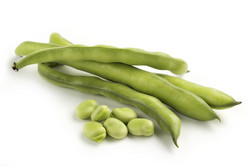Customised legumes for improved crop management
Legumes are extremely important for nutrition. However, the European varieties currently grown are vulnerable to climate change, which could jeopardize yields in the near future. The EUROLEGUME (Enhancing of legumes growing in Europe through sustainable cropping for protein supply for food and feed) project aims to develop varieties of pea, faba bean and cowpea, resistant to abiotic stress. It will also ensure that the agricultural products meet the market demand. The initiative is focused on pea, faba, and cowpea cultivars grown in northern and southern Europe. Expected results will enable legume grain imports to be reduced by 20 % and improve soil productivity and well the sustainability of the farming system. EUROLEGUME partners summarized in two handbooks the protocols for harmonising the scheduled procedures. Researchers gathered a large number of cultivars, selecting them according to biomass, leaf morphology, Huber value, root architecture and yield characteristics under diverse agro-climatic conditions. Unlike most plant types, legumes fix nitrogen in soils by synergic relationships with Rhizobia and mycorrhizal fungi. They help reduce the need for fertilisers and avoid economic inputs and environmental impacts. EUROLEGUME assessed the effects of inoculants isolated from 139 samples on legumes adaptability and yield, and on soil properties. The work produced fingerprint analysis for 65 Rhizobial isolates. Crop rotation experiments highlighted the positive effect of organic matter from legumes on soil properties and on yield in diverse cropping systems. The team also optimized the methodology for the study of in vitro digestibility and evaluated the effects of legume-based supplements for livestock, estimating the maximum level. Peas, faba beans, and cowpea were assessed as ingredients for the development of innovative foods with regard to physicochemical properties and nutritional composition. This enabled the best combinations to be chosen for the planned products. Alternative processing technologies are also being considered to improve the commercial viability of these foods.
Keywords
Legumes, cultivars, pea, faba bean, cowpea, sustainabiliuty, innovative foods, inoculants



